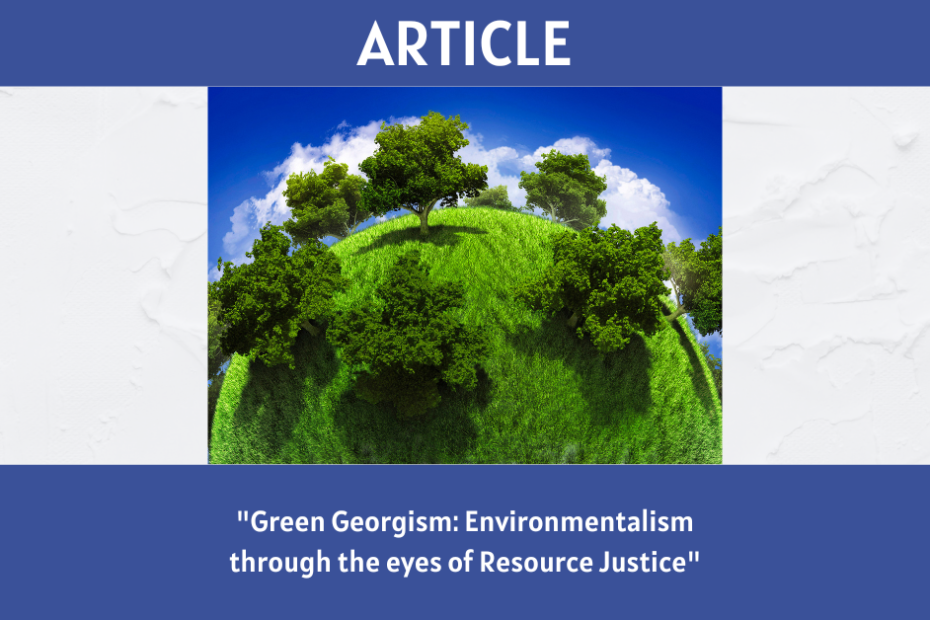Our world is facing an ever-escalating array of environmental challenges. From the alarming rise in global temperatures and the subsequent impacts of climate change, including extreme weather events and shrinking ice caps, to the devastating consequences of deforestation, habitat loss, and species extinction, our planet is in dire need of urgent action. These challenges require us to think carefully about how we can promote the sustainable and equitable management of natural resources such as land, minerals, oceans and wildlife.
Here at the Robert Schalkenbach Foundation our core mission is to advance the ideas of Henry George and to realize his vision of a world that recognizes humanity’s collective right to the bounty provided by our planetary resources. We have historically focused on applying this Georgist worldview to urban land use and property tax reform. However, our pioneering research center, Resource Justice (RJ), is responding to these looming environmental challenges by expanding our mission and working to foster research into the sustainable, efficient and equitable utilization of natural resources. Recognizing the urgent need for actionable policy solutions motivated by compelling values and informed by responsive research, we consider these ecological concerns to be key priorities here at RJ.
In this series of short articles, we will connect the Georgist worldview with key concepts from within environmental policymaking. This first article will lay out the foundation for a Green Georgism, explaining how the ideas of Henry George connect with environmental concerns, and which ultimately motivate our strategic mission here at Resource Justice. Our second piece will identify connections between the Georgist worldview and key perspectives from the past century of environmentalism, including Herman Daly’s categorization of natural capital, Elinor Ostrom’s perspectives on the commons, and Kate Raworth’s ‘doughnut economics.’ Combining the insights of these complementary worldviews, our final article will identify key principles for approaching environmental policy from which RJ will be producing research and resources which help ensure that our natural resources are harnessed productively and sustainably for the benefit and wellbeing of all.
Georgism & Resource Justice
Henry George was a 19th century American political-economist and activist, whose ideas resonate powerfully with the environmentalist themes of our time. George explained that economic activity involves three factors of production: access to land and other natural resources, on which workers conduct labor, often aided by capital (things created by previous production, such as machinery, computers and buildings). George argued that individuals are entitled to claim ownership of their own labor and the capital they create, but that value provided by the free gifts of nature should rightfully be shared among all humans in equal share.
In Progress & Poverty, his 1879 magnum opus, George explained that rational management and conservation of natural resources would help humanity avoid running up against the limits of growth, citing the leasing of Alaska fisheries as an example. Political advocacy by those inspired by these ideas, often called Georgists, frequently saw them allied with liberal and progressive organizations, the labor movement and conservationists.
George is best known for his insight that because land is a necessary input into all human activity, yet land in a given location is inherently scarce, social progress would inevitably drive up land rents, funneling the fruits of prosperity into the pockets of landowners while impoverishing the landless. As a remedy, he recommended taxing land at its rental value (a land value tax, LVT) and deploying revenues in ways which benefit all members of society.
Less well understood, however, is that George used the word ‘land’ to refer to “all natural materials, forces, and opportunities,” a definition which clearly includes all natural resources with which this planet is endowed. This broader definition of “land” as encompassing all natural resources aligns with George’s vision of a fairer economic system that acknowledges humanity’s collective right to the bounty provided by our planetary resources. For clarity, we will apply this definition to the words “nature” and “natural resources” throughout our work, to recognize that George’s ideas comfortably apply to many of the challenges which confront modern environmentalism such as management of fisheries, land and the carbon sink; responses to climate change and the relentless extraction of non-renewable mineral deposits; and maintenance of biodiversity and other environmental amenities.
Conclusion: A path forward to Green Georgism
Our mission at Resource Justice fundamentally shares in George’s recognition of the unique importance of our natural resources and the desperate need to ensure their efficient, equitable and sustainable use. We work to identify ways in which nature is being privatized and exploited to enrich specific individuals, and investigate policy solutions which will instead ensure that nature is put to productive and sustainable use, for the health and well-being of all members of our human community. Our mission is to conduct research and produce materials that support policymakers addressing today’s urgent environmental challenges. By combining the ideological framework laid out by Henry George with the objectives of the environmentalist movement and the insights of modern ecological research, we hope to chart a clear path forward for a form of Green Georgism. By addressing environmental justice concerns and incorporating principles of economic equity and resource distribution, we can foster a more sustainable and equitable future.
Subscribe to our YouTube channel and learn more here.
Authored by Shruti Punjabi and Steve Hoskins

